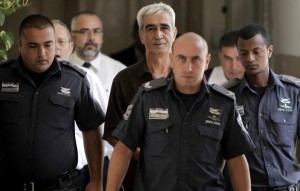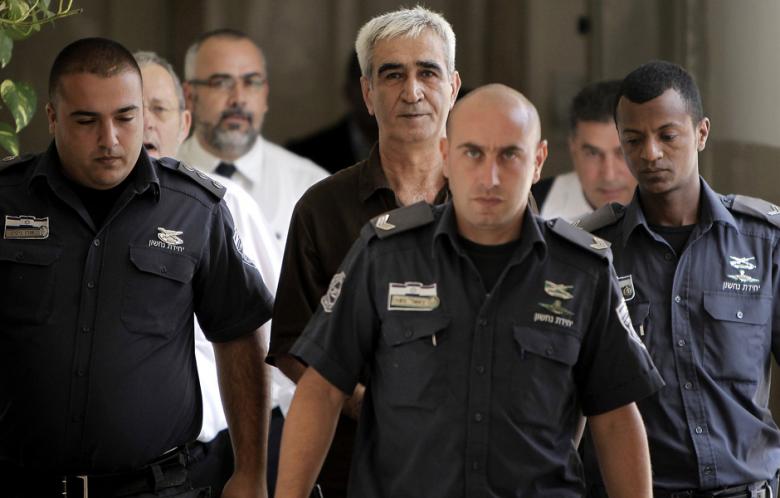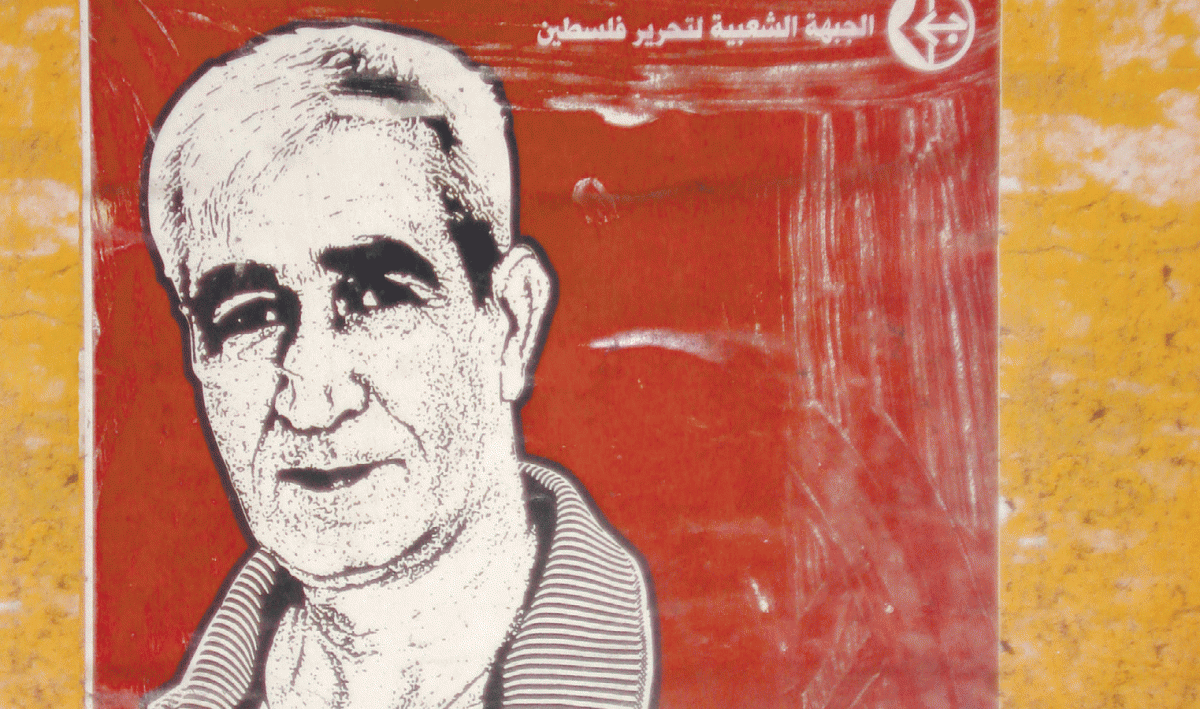 The following piece, by Palestinian writer Linah Alsaafin, was published in Al-Akhbar English on September 9, 2012:
The following piece, by Palestinian writer Linah Alsaafin, was published in Al-Akhbar English on September 9, 2012:
The last time that 26 year old Sumoud Saadat saw her father, the Secretary-General for the Popular Front for the Liberation of Palestine (PFLP) Ahmad Saadat, was during a court session in 2008.
Sumoud and two of her three siblings are banned from visiting their father as they constitute, according to the Israeli Prison Service (IPS), a “security threat.” Her mother Abla and oldest brother Ghassan are able to visit Saadat as they are both holders of the blue Jerusalem ID card, which grants them more privileges and enables relative freedom of movement within the West Bank and the 1948 occupied territories.
The agreement, signed on 14 May 2012 between the IPS and the Higher Committee of Prisoners which signaled the end of the 28 day mass hunger strike of approximately 2,500 Palestinian prisoners, contained five provisions that Israel has systematically violated.
One of the conditions, according to prisoner rights group Addameer’s Quarterly Update, is the reinstatement of family visits for first degree relatives of prisoners from the Gaza Strip (who have been banned from visitation rights for five years) and for families from the West Bank who have been denied visits based on vague “security” reasons.
“There are 700 families from the West Bank who, prior to the agreement, were prevented from visiting their loved ones in Israeli jails based on security reasons, as well as the accusation of having no familial ties to the prisoner,” said Saadat’s lawyer, Mahmoud Hassan.
The families who are still banned from visiting their relatives behind bars have directed their anger at the International Committee of the Red Cross (ICRC), the body responsible for facilitating the family visits to prisoners inside Israeli prisons. However, director of the ICRC branch in Ramallah Suha Musleh criticized the agreement for not taking into consideration the role of the ICRC in its conditions.
During the hunger strike in Israeli prisons, or the Battle of Empty Stomachs as it is popularly referred to, the Red Cross’ team of doctors would visit the hunger strikers whenever the IPS allowed them to do so.
“Every day, permits are issued by Israel to family members to visit the prisoners,” Musleh commented. “Yet, we were not a part of or even asked to be a part of the agreement. As far as I know, no one has a copy of the agreement,” she added.
“The fault is on the Palestinian side for not taking concrete guarantees for ensuring the conditions of the agreement to be upheld,” Hassan emphasized, “and on the Egyptian mediator for not taking any official guarantees and instead relied on the good intentions of Israel. The supposition that Israel has good intentions is completely flawed, because it bases its decisions purely on politics, not security.”
In 2002, Ahmad Saadat was arrested by Palestinian Authority (PA) Special Forces, after the PA succumbed to pressure from Israel who accused Saadat of organizing the assassination of the far-right Israeli Minister of Tourism, Rehavam Zeevi in October 2001. Zeevi was a known proponent of targeted assassinations of Palestinians and forced expulsion, and his murder was seen as a response to the targeted killing of Abu Ali Mustafa, the previous secretary-general of the PFLP, in his office in Ramallah.
A month later, four members from the PFLP’s armed wing, the Abu Ali Mustafa Brigade were arrested in Nablus by the PA’s General Intelligence Services and together with Saadat, were held in the Muqata compound in Ramallah.
The PA, contrary to the popular reaction from Palestinians, condemned the assassination and Jibril Rjoub, the former head of the West Bank Preventative Security Forces was the one who issued an ultimatum against Saadat to turn himself in or face arrest.
On 1 May 2002, Saadat and five other PFLP members were moved from Muqata to Jericho prison in a deal between Israel and the late president of the PA Yasser Arafat that ended the 33 day siege on Muqata.
Four years later, on 3 March 2006, the Israeli occupation army raided Jericho Prison, which under the façade of PA control was actually guarded by US and UK observers. The time between Israel’s arrest and sentencing of Saadat, a total of two years, involved more than 30 court sessions, mostly held in Ofer prison on the outskirts of Ramallah.
These sessions allowed for only two members of the Saadat family to attend at a time, and Sumoud had to alternate with her two brothers, sister and mother to ensure that everyone got to see him. Sumoud got to visit her father four times.
“Inside the court room,” Sumoud recalls, “we weren’t allowed to speak to my father. We weren’t allowed to physically touch him, even for a handshake. We tried to communicate with facial expressions, that was it.”
Defining herself as the closest to her father, Sumoud attributes that to the fact that her father was missing from her life for her first two years, as he was behind bars. “He made an extra effort to get closer to me, since I kept rejecting him and referred to my uncle as my father.”
Saadat was sentenced on Christmas Day in 2008 to a life sentence of 30 years in prison. A few months later, there was an order of six months of solitary confinement against Saadat that was renewed every six months for three years before the May 14 agreement was signed.
Saadat refused to recognize the military court, which couldn’t charge him with anything concrete and relied only on circumstantial evidence. He was charged with being the head of the party that carried out the assassination of Zeevi as well as being responsible for actions that were carried out by various members of the PFLP, dating back to the 1980s.
Sumoud affirmed that her father would refuse to be released based on the “good intentions” of Israel, a provision that Israel uses to reward the PA for resuming negotiations, a term that has been synonymous with PA concessions. Saadat is adamant that the only way he will be released is through a prisoner exchange or an end to the occupation.
Since the capture of Shalit, Saadat’s name was among those put forward. As news of a possible prisoner exchange began to leak out, high profile members of Hamas, including Aziz Duweik and politburo Khaled Meshaal, personally assured the Saadat family that he was without a doubt among the prisoners returning home and not one of those sent to exile.
Rumors oscillated between the release of Saadat along with popular Fatah man Marwan Barghouti to their continued imprisonment. Nevertheless, when final confirmation of the list of prisoners due to be released in October was out, Sumoud and her siblings were shocked that their father’s name was not one of them.
“My father always told us to never get our hopes up so high, since the Israeli Prison Service are so unpredictable,” Sumoud said. “But it was still a huge shock for the family, especially after Hamas guaranteed us that he would be released.”
On April 17 this year, Saadat joined a mass hunger strike, which grew to involve approximately 2,500 prisoners out of the total 5,000 Palestinian prisoners in Israeli jails. His health deteriorated rapidly, and he was transferred to the Ramleh prison hospital, where he was still kept in total isolation.
Former hunger striker Thaer Halahleh, who went 77 days without food and was also in the Ramleh prison hospital, relayed to Sumoud how even on the brink of death, Saadat was kept in a small cell all by himself, padded with some sort of nylon sheets that prevented him from catching any snippets of conversations from the other prisoners. The only time he saw the prisoners was during the night the agreement was signed on May 14, where he was brought out in a wheelchair.
After three years in isolation, Sadaat secured a major triumph and is now in Shatta prison, sharing a cell with other prisoners. Although his wife Abla and oldest son Ghassan were able to visit him after the hunger strike ended, his other children are still banned from doing so, on the pretext of being considered as “security threats” by the IPS.
Saleh Hammouri, the French Palestinian former prisoner who spent seven years in jail before being released in the second half of the deal’s implementation in December 2011, was in Hadarim prison with Saadat back in 2007.
“Once, the prison warden, who used to show up barely once a month, came in the morning and informed Saadat that he had a private visit from someone,” Hammouri recalls. “A private visit is a big deal, because it means that the visit is conducted without any physical barrier, and usually they are granted only in the most urgent cases or after dozens and dozens of applications.”
Saadat had asked the warden if the private visit was for all the prisoners. The warden replied that it was just for him.
“Saadat refused to go unless all the other prisoners got the same privilege,” Hammouri smiles. “The prison warden took that as a personal insult against him, and treated him, let’s say, less favorably from that day on.”
Lawyer Mahmoud Hassan acknowledges that the end of Saadat’s isolation is a victory, and is adamant that the release of all Palestinian prisoners is not an unattainable dream, as it is presented in international law.
The Fourth Geneva Convention forbids the forced transfer of persons from occupied land to the territory of the occupier. Therefore Israel using the excuse that it does not give permits to family members because they do not hold Israeli IDs is fallacious because it is primarily based on violating international law by transferring the prisoners in the first place.
“Israel from the very first day intended to use the prisoners as a pressure card for negotiations,” Hassan stated.
The most recent example is Netanyahu promising to release 125 prisoners incarcerated before the signing of the Oslo Accords and the establishment of the PA in 1993 if Abbas returns to the negotiating table, or conversely vowing not to release prisoners if the PA was to go the UN.
“If there was significant pressure from the Arab countries and the world in general,” Hassan continued, “the prisoners’ cause will end with the release of all prisoners, precisely because it is an international cause, as Israel is contravening the Geneva Conventions.”
This article is an edited translation from the Arabic Edition.








